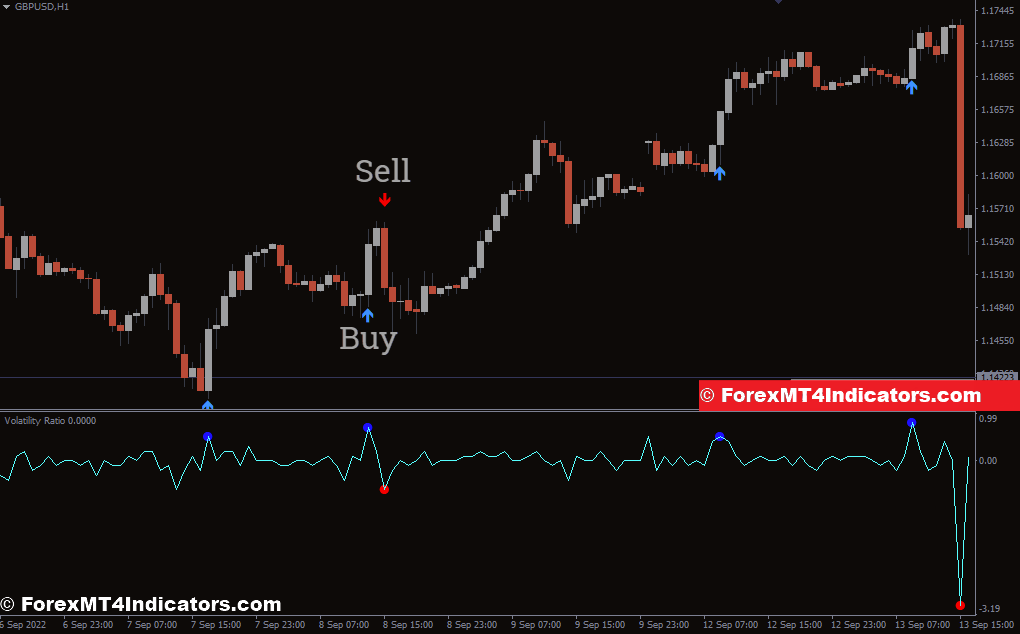- Home
- Features
- Business
- Active
- Sports
- Shop
Top Insights

The foreign exchange market, also known as Forex, can be a thrilling arena for traders. However, its inherent volatility can sometimes feel like riding a rollercoaster blindfolded. This is where technical analysis tools like the Volatility Ratio V2 MT4 Indicator come in handy. This guide delves into the world of the Volatility Ratio V2, equipping you with the knowledge to navigate market fluctuations with greater confidence.
What is the Volatility Ratio V2 Indicator?
Imagine you’re planning a road trip. You wouldn’t set off without a map, right? Similarly, successful traders need tools to understand how far and how fast prices might move. The Volatility Ratio V2 acts as your roadmap in the ever-changing terrain of the Forex market.
In essence, this indicator gauges the level of price fluctuation (volatility) over a specific timeframe. It compares the current price range to the recent historical range, providing valuable insights into potential trend reversals (changes in direction) and breakouts (sharp price movements).
The Volatility Ratio V2 builds upon the foundation of its predecessor, the Volatility Ratio Indicator. While both indicators share the core functionality of measuring volatility, the V2 boasts some distinguishing features, offering potentially more refined analysis.
Understanding How the Volatility Ratio V2 Works
So, how exactly does this indicator translate market movements into actionable information? Here’s a breakdown of its inner workings:
Calculation
The Volatility Ratio V2 relies on a concept called True Range (TR). This goes beyond the simple difference between the high and low prices for a period. It considers the closing price compared to both the high and low, capturing the most significant price movement within a timeframe. The indicator then calculates the ratio between the current TR and the average TR over a defined historical period.
Interpreting the Indicator Readings
The Volatility Ratio V2 presents its findings as a numerical value. Generally, readings below 1 suggest that the market is relatively calm, with price movements staying within the recent historical range. Conversely, values above 1 indicate an increase in volatility, potentially signaling a breakout or a trend reversal.
Customization Options
The beauty of the Volatility Ratio V2 lies in its adaptability. You can customize the indicator by adjusting the following:
- Look-back Period: This defines the historical timeframe used to calculate the average TR. A shorter period emphasizes recent volatility, while a longer period offers a broader perspective.
- Threshold Levels: You can set specific values (e.g., 0.5 or 1.5) to receive alerts when the Volatility Ratio V2 crosses those thresholds, potentially indicating significant volatility shifts.
Identifying Trading Signals with the Volatility Ratio V2
The Volatility Ratio V2 isn’t a magic crystal ball, but it can illuminate potential opportunities in the market. Here’s how to translate its readings into trading signals:
- Potential Trend Reversals: A sudden spike in the Volatility Ratio V2, particularly after a prolonged period of low volatility, might indicate a potential trend reversal. This could be a sign that the market is breaking out of its recent range and embarking on a new directional move.
- Breakouts and Increased Volatility: Values consistently exceeding 1 for an extended period can suggest a breakout, where prices forcefully push through established support or resistance levels. This surge in volatility often precedes significant price movements.
- Confirmation with Other Indicators: Remember, no single indicator is foolproof. It’s crucial to confirm the signals from the Volatility Ratio V2 with other technical analysis tools like price action patterns, moving averages, or volume indicators. This confluence of signals strengthens the validity of a potential trade.
It’s important to remember that past performance is not necessarily indicative of future results. While the Volatility Ratio V2 can provide valuable insights, always maintain a healthy dose of skepticism and conduct thorough research before making any trading decisions.
Advantages and Limitations of the Volatility Ratio V2
Now that you understand the basics of the Volatility Ratio V2, let’s explore its pros and cons:
Advantages
- Enhanced Volatility Assessment: The indicator provides a clear and concise visualization of market volatility, helping traders gauge the risk involved in potential trades.
- Adaptability: The customizable parameters allow traders to tailor the indicator to their specific trading style and preferred timeframe.
- Breakout Identification: The Volatility Ratio V2 can be a valuable tool for identifying potential breakouts, offering opportunities to capitalize on significant price movements.
Limitations
- Overreliance on a Single Indicator: As mentioned earlier, relying solely on the Volatility Ratio V2 can be risky. It’s crucial to combine it with other technical analysis tools for a more comprehensive picture.
How to Trade with Volatility Ratio V2 Indicator
Buy Entry
- Look for a spike in the Volatility Ratio V2, particularly after a period of low volatility (readings below 1).
- Confirmation is key: Combine this with a bullish price action pattern like a breakout above a resistance level or a continuation pattern within an uptrend.
- Entry: Consider entering a Long position (buying) after the price confirms the breakout or continues the uptrend following the pattern.
- Stop-Loss: Place a stop-loss order below the recent swing low or support level to limit potential losses if the price reverses.
- Take-Profit: Set a take-profit target based on your risk-reward ratio and technical analysis. Common profit targets include Fibonacci retracement levels or historical highs.
Sell Entry
- Look for a sustained increase in the Volatility Ratio V2 above 1, potentially indicating a weakening uptrend or an upcoming reversal.
- Confirmation is key: Look for bearish price action patterns like a breakdown below a support level or a reversal pattern within a downtrend.
- Entry: Consider entering a Short position (selling) after the price confirms the breakdown or the reversal pattern.
- Stop-Loss: Place a stop-loss order above the recent swing high or resistance level to limit potential losses if the price rallies.
- Take-Profit: Set a take-profit target based on your risk-reward ratio and technical analysis. Common profit targets include Fibonacci retracement levels or historical lows.
Volatility Ratio V2 Indicator Settings
Conclusion
The Volatility Ratio V2 is a valuable tool for any Forex trader seeking to navigate the ever-changing market landscape. It empowers you to assess market volatility, identify potential breakouts and trend reversals, and ultimately, make more informed trading decisions.
Recommended MT4/MT5 Brokers
XM Broker
- Free $50 To Start Trading Instantly! (Withdraw-able Profit)
- Deposit Bonus up to $5,000
- Unlimited Loyalty Program
- Award Winning Forex Broker
- Additional Exclusive Bonuses Throughout The Year
>> Sign Up for XM Broker Account here <<
FBS Broker
- Trade 100 Bonus: Free $100 to kickstart your trading journey!
- 100% Deposit Bonus: Double your deposit up to $10,000 and trade with enhanced capital.
- Leverage up to 1:3000: Maximizing potential profits with one of the highest leverage options available.
- ‘Best Customer Service Broker Asia’ Award: Recognized excellence in customer support and service.
- Seasonal Promotions: Enjoy a variety of exclusive bonuses and promotional offers all year round.
>> Sign Up for FBS Broker Account here <<
(Free MT4 Indicators Download)
Click here below to download:
Recent Posts
Categories
Related Articles
Is AMD stock a buy? A buyTheDip consideration at ForexLive.com
AMD Stock before NVDA's quarterly earnings event this week: After the failed...
ByglobalreutersFebruary 23, 2025NVDA earnings report is coming & many are still wondering about DeepSeek
How DeepSeek is Changing the AI Game and Its Potential Impact on...
ByglobalreutersFebruary 22, 2025Weekly Market Outlook (24-28 February)
UPCOMING EVENTS:Monday: German IFO.Tuesday: US Consumer Confidence.Wednesday: Australia Monthly CPI.Thursday: Switzerland Q4...
ByglobalreutersFebruary 22, 2025Video: How everything could go right for the Canadian dollar
The Canadian dollar is facing risks from tariffs, trade, global growth, domestic...
ByglobalreutersFebruary 22, 2025










Leave a comment